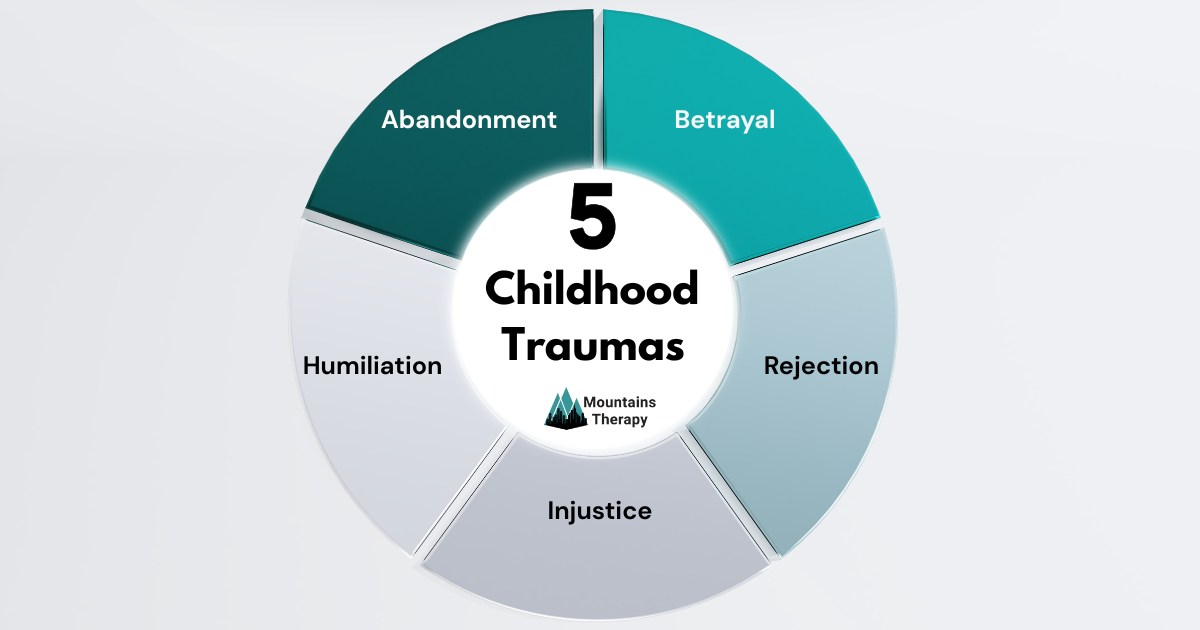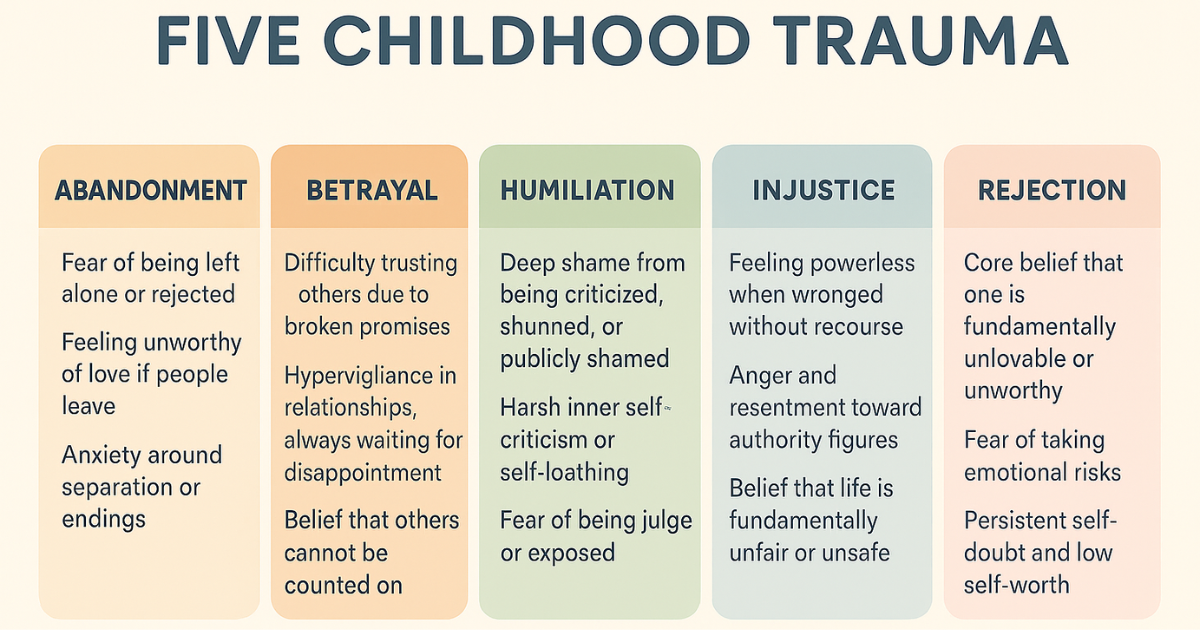How to Heal Childhood Trauma Wounds: Identifying the 5 Wounds, 8 Traumas & Common Signs
Learn more about Trauma Therapy.
In This Blog, You’ll Learn:
✅
What childhood trauma and childhood wounds are
✅ The 5 core wounds of childhood trauma
✅ The 8 major types of childhood trauma
✅ Common patterns of childhood trauma
✅ Myths vs. facts about childhood trauma
✅ How therapy helps heal childhood wounds
What Is Childhood Trauma and Why Does It Matter?
Childhood trauma shapes the foundation of who we become. When adverse experiences such as neglect, abuse, or loss occur early in life, they leave lasting emotional and physical marks. Unresolved childhood wounds can impact your sense of safety, your relationships, and your self-worth. At Mountains Therapy in Montclair, NJ, we believe that understanding and addressing these deep wounds is the first step toward healing childhood trauma and reclaiming your emotional well-being.
What Are Childhood Wounds?
Childhood wounds are deep emotional injuries that develop when our most basic needs for safety, affection, validation, and consistency are not met during key stages of development. These wounds are often invisible but can shape our emotional landscape for years, affecting how we see ourselves, others, and the world.
Childhood wounds may result from:
- Overt trauma such as physical abuse, sexual abuse, or severe neglect
- Subtle harms — including emotional neglect, inconsistent caregiving, invalidation of feelings, or even growing up in a chaotic or unpredictable environment
Over time, these wounds can show up in ways that impact every part of life:
- Chronic anxiety — Constant worry or feeling on edge, always waiting for something bad to happen
- Low self-esteem — Harsh inner self-criticism, feeling like you’re "not enough"
- Difficulty trusting others — Fear that people will hurt, betray, or leave you
- Challenges in forming healthy relationships — Struggling with closeness, boundaries, or feeling safe in connection
You don’t need to have experienced overt abuse to carry deep childhood wounds. Emotional neglect or a lack of attunement can be just as harmful. Many people don’t realize that these patterns stem from unhealed childhood wounds but therapy can help uncover and heal these layers.
What Are Childhood Attachment Wounds?
Our earliest bonds with caregivers shape how we understand love, trust, and safety. Childhood attachment wounds occur when these bonds are disrupted when a caregiver is unavailable, inconsistent, intrusive, or frightening. For a child, this teaches the nervous system that relationships are unsafe, unpredictable, or dangerous. Over time, this belief becomes wired into the brain and body.
As an adult, unresolved attachment wounds may look like:
- Clinging to partners — Seeking constant reassurance and fearing abandonment
- Pushing people away — Withdrawing or shutting down to avoid getting hurt
- Fear of intimacy — Sabotaging closeness or feeling anxious when relationships deepen
- Feeling unworthy of love — Internalizing shame and believing you're "too much" or "not enough" to be loved
These patterns often repeat unconsciously but therapy helps you recognize them, understand their origins, and begin creating secure emotional connections in your life. Healing attachment wounds allows you to build relationships rooted in trust, safety, and authenticity.
What are the 5 Wounds of Childhood Trauma?
Mental health professionals often identify these five core wounds as some of the most profound emotional injuries caused by childhood trauma:
- 1. Abandonment
- Fear of being left alone or rejected
- Feeling unworthy of love if people leave
- Anxiety around separation or endings
- 2. Betrayal
- Difficulty trusting others due to broken promises
- Hypervigilance in relationships, always waiting for disappointment
- Belief that others cannot be counted on
- 3. Humiliation
- Deep shame from being criticized, shunned, or publicly shamed
- Harsh inner self-criticism or self-loathing
- Fear of being judged or exposed
- 4. Injustice
- Feeling powerless when wronged without recourse
- Anger and resentment toward authority figures
- Belief that life is fundamentally unfair or unsafe
- 5. Rejection
- Core belief that one is fundamentally unlovable or unworthy
- Fear of taking emotional risks
- Persistent self-doubt and low self-worth
- Recognizing which wounds resonate most strongly is an important step toward targeted, compassionate healing in therapy.
What are the 8 Major Childhood Traumas?
Experts often categorize childhood trauma into these eight common domains, though many individuals experience more than one type. Understanding which types of trauma you’ve experienced can help guide therapy and shape a treatment plan that addresses your unique history and needs.
Types of Childhood Traumas
- 1. Physical abuse
- Deliberate infliction of pain or injury
- Fear of physical harm or violence in relationships
- 2. Sexual abuse
- Any unwanted sexual contact, coercion, or violation
- Deep impacts on body image, trust, and boundaries
- 3. Emotional abuse
- Constant criticism, belittling, verbal attacks, or manipulation
- Erosion of self-esteem and sense of self-worth
- 4. Physical neglect
- Lack of adequate food, shelter, or medical care
- Ongoing survival stress and fear of not having basic needs met
- 5. Emotional neglect
- Lack of warmth, affection, or attunement from caregivers
- Feeling unseen, unheard, or emotionally abandoned
- 6. Witnessing domestic violence
- Exposure to violence or abuse between caregivers
- Constant fear, hypervigilance, and nervous system dysregulation
- 7. Parental substance abuse or mental illness
- Growing up with an unpredictable or emotionally unavailable parent
- Having to parent oneself or others too early in life
- 8. Loss or separation (death, divorce, foster care)
- Sudden or prolonged separation from a primary caregiver
- Grief, attachment disruption, and feelings of abandonment
What are the most Common Childhood Wounds?
While every person’s experience of childhood trauma is unique, certain emotional and behavioral patterns often emerge as coping mechanisms or responses to early pain. Therapy helps you recognize and gently unwind these patterns so you can live with greater freedom, safety, and connection.
Common Patterns
- Emotional neglect
- Growing up feeling unseen, unheard, or dismissed
- Learning to suppress emotions to avoid being a burden
- Struggling to identify or express your feelings in adulthood
- Inconsistent caregiving
- Feeling uncertain whether your needs will be met
- Anxiety around asking for help or relying on others
- Fear of emotional closeness due to unpredictability in early relationships
- Emotional dysregulation
- Sudden mood swings or intense emotional reactions
- Feeling overwhelmed by anger, sadness, or fear
- Difficulty calming down once triggered or upset
- Relational patterns
- Repeating cycles of unhealthy, unfulfilling, or toxic relationships
- Difficulty setting healthy boundaries
- Fear of abandonment or enmeshment with others
- Self-defeating beliefs
- Internalized messages such as:
- "I’m not good enough."
- "I don’t deserve happiness."
- "I will always be alone."
- Harsh self-criticism and perfectionism
- Physical symptoms
- Chronic pain, headaches, digestive issues without clear medical cause
- Nervous system dysregulation (hypervigilance, sleep disturbances, fatigue)
- Health issues exacerbated by long-term stress or trauma
- Hypervigilance
- Constantly scanning for danger or potential rejection
- Difficulty relaxing or feeling safe, even in calm situations
- People-pleasing
- Prioritizing others’ needs above your own
- Fear of conflict or disappointing others
- Difficulty saying no or asserting boundaries
What Childhood Trauma Deeply Affects
Childhood trauma disrupts four key areas of development but these disruptions can absolutely be healed through therapy and self-awareness. Therapy works by helping you gently explore these areas, release shame, rebuild self-worth, and learn new ways of relating to yourself and others. With time and support, deep healing is absolutely possible.
- Brain architecture
- Chronic stress during childhood alters neural pathways, impacting memory, attention, and emotion regulation
- Heightened sensitivity to perceived threat, even in safe environments
- Difficulty shifting out of "survival mode"
- Emotional regulation
- Trouble identifying and naming emotions
- Difficulty soothing strong feelings in healthy ways
- Patterns of emotional suppression or overwhelm
- Self-concept
- Internalizing blame and shame for what happened in childhood
- Forming core beliefs such as:
- "I’m broken."
- "I’m unlovable."
- "Everything is my fault."
- Ongoing struggles with self-worth and self-compassion
- Interpersonal relationships
- Mistrust of others or fear of intimacy
- Fear of rejection or abandonment
- Difficulty sustaining healthy, secure relationships
- Re-enacting childhood dynamics in adult relationships (attachment wounds)
Myths and Facts About Childhood Trauma
Myth: Childhood trauma is always the result of severe abuse.
✅ Fact: Subtle experiences like emotional neglect or inconsistent caregiving can also create deep wounds.
Myth: If you can’t remember the trauma, it didn’t affect you.
✅ Fact: The body remembers even if conscious memories are vague, trauma can shape emotional responses and behavior.
Myth: Childhood trauma can’t be healed.
✅ Fact: With therapy and support, it is absolutely possible to heal childhood wounds and build a healthier future.
How to Heal Childhood Trauma Wounds
Healing is a journey, not a quick fix. It takes time, compassion, and patience but every step you take matters.The path to healing childhood wounds is deeply personal but with support, it is absolutely possible to build a life rooted in safety, connection, and self-worth.
Key steps include:
- Acknowledge the hurt
- Naming your pain validates your experience.
- You can’t heal what you pretend isn’t there.
- Develop safe connections
- Build relationships that model trust, consistency, and care. Healing often happens through safe connection with others.
- Learn emotional skills
- Practice tools like mindfulness, grounding exercises, breathwork, and distress tolerance to help manage overwhelming feelings and feel more in control of your emotional world.
- Reframe beliefs
- Challenge negative core beliefs (such as "I’m unworthy" or "I’m broken") and replace them with compassionate truths about your inherent worth.
- Integrate the past
- Therapies like EMDR, somatic experiencing, and other body-based approaches help process trauma stored in the nervous system allowing you to move forward without being stuck in survival mode.
- Practice self-compassion
- Learn to treat yourself with the same care and kindness you would offer a loved one. Healing isn’t about perfection it’s about progress and self-acceptance.
How Therapy Helps With Childhood Trauma
At Mountains Therapy, our trauma-informed therapists use evidence-based approaches to support healing from childhood trauma and help you reclaim your emotional well-being. Our team creates a safe, nonjudgmental space where you can process the past and build the life you deserve. You don’t have to navigate childhood trauma alone. Therapy offers a safe, supportive space to process your experiences, heal old wounds, and build a life of greater freedom, connection, and resilience.
We offer the following therapeutic approaches to support healing:
- Individual Therapy for Childhood Trauma — Provides personalized support to explore your childhood experiences, develop self-awareness, and build tools for emotional resilience and lasting healing.
- Family Therapy for Childhood Trauma — Supports repairing family relationships, enhancing communication, and building a more supportive home environment.
- Cognitive Behavioral Therapy - CBT for Childhood Trauma — Helps reframe negative thought patterns, reduce self-defeating beliefs, and build healthier coping strategies.
- Dialectical Behavior Therapy - DBT for Childhood Trauma — Teaches essential skills for emotional regulation, distress tolerance, and interpersonal effectiveness.
You Are Not Alone!
Healing childhood trauma is about reclaiming the life you deserve one where safety, connection, and self-worth flourish. At Mountains Therapy, our trauma-informed team is here to support you every step of the way. Reach out to us today to begin your healing journey. You don’t have to do this alone.















